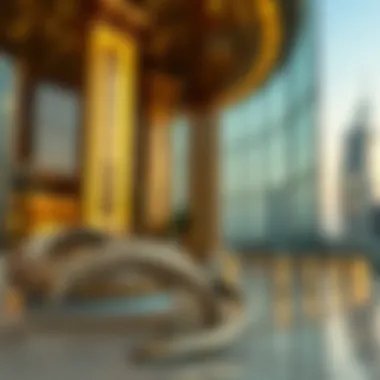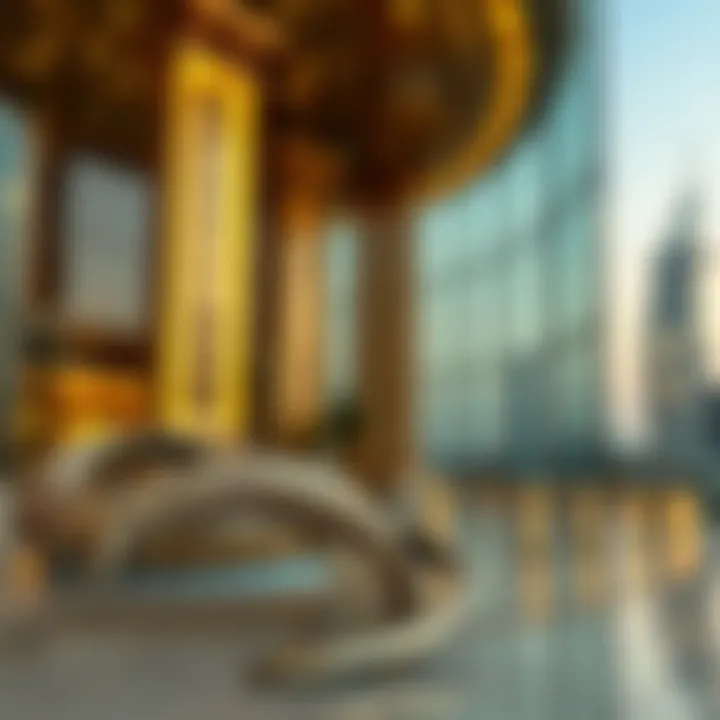Silver Market Trends and Price Analysis in Dubai


Intro
Silver, often regarded as a safe-haven asset, has been a topic of interest for many investors and consumers alike, especially in the vibrant market of Dubai. The fluctuations in silver rates in this city are not just numbers; they represent an intricate dance between global market influences, local demand, and economic shifts. Understanding the dynamics of these rates can arm buyers and sellers with the insights needed to navigate the silver market effectively.
In this article, we delve deep into the factors driving silver prices in Dubai, explore essential guidelines for buying and selling, and discuss current trends that shape the market. Whether you’re a seasoned investor looking to diversify your portfolio or a newcomer aiming to make informed purchases, this comprehensive analysis promises to illuminate the path ahead.
From the pulse of the property market to practical buying tips, we aim to cover every angle, ensuring you walk away with a solid understanding of how to approach silver investments in Dubai. Let's embark on this journey to uncover the nuances of silver rates in this dynamic city.
Preamble to Silver Investment in Dubai
Investing in silver in Dubai is not just a trend; it's an exploration into a vibrant market that holds significant potential. With its rich trading history and strategic geographical location, Dubai presents a unique opportunity for both seasoned investors and newcomers ready to dip their toes into this world of precious metals. This article serves as a comprehensive guide, illuminating the key components that shape silver investment in the emirate, thus empowering investors to make informed decisions.
Understanding the Appeal of Silver
Silver has been cherished for centuries, esteemed not only for its aesthetic qualities but also for its practical applications across industries. In Dubai, silver isn’t merely a commodity; it symbolizes wealth and status. There's something deeply alluring about owning physical silver, from intricately crafted jewelry to pure bullion bars. Unlike more volatile assets, silver tends to maintain a steady value, offering a safety net in uncertain economic times. Furthermore, its accessibility makes it an appealing choice for new investors who may find the idea of purchasing gold intimidating.
Moreover, the lower entry price compared to gold means that more people can participate in the silver market. Many see silver as a hedge against inflation and currency fluctuations, enhancing its allure during periods of economic uncertainty. This multifaceted appeal makes silver investment particularly attractive to a diverse group of investors, whether they are looking to bolsters their portfolios or secure their wealth.
The Significance of Dubai in the Global Silver Market
Dubai has carved out a unique place in the global silver market. Its strategic location as a trading hub connects East and West, engendering a vibrant marketplace where silver flows freely. The emirate has established itself as a key player due to factors such as tax advantages, a robust regulatory framework, and cutting-edge infrastructure. These elements converge to create an environment that's fertile for investment.
Not to forget, Dubai hosts the Dubai Commodity Exchange (DGCX) which plays a crucial role in regulating silver trading standards. Investors can find themselves in a well-monitored marketplace that prioritizes transparency and trust. This integrity not only bolsters confidence among buyers but also fosters a healthy competition among dealers.
Additionally, the annual events such as the Dubai Jewelry Show highlight the emirate's dedication to showcasing silver and other precious metals, propelling market engagement. As the world of silver continues to evolve, Dubai remains a beacon for those seeking to navigate the intricacies of this market.
Current Trends in Silver Prices
The silver market in Dubai is witnessing dynamic changes, shaped by a myriad of influences ranging from economic factors to cultural preferences. Understanding current trends in silver prices is crucial not just for seasoned investors but also for everyday consumers wanting to make informed purchases. This section delves into the essence of these trends, shedding light on price movements and offering a comparative view against other precious metals.
Analyzing Recent Price Movements
In the recent past, silver prices have fluctuated dramatically, reflecting both local and global market conditions. For instance, in early 2023, silver was trading at around AED 2,800 per kilogram, showcasing a significant spike from the previous year's averages. Even though prices surged, they have since exhibited volatility due to several indicators. Here are some key factors influencing these movements:
- Demand in Jewelry and Industry: With Dubai being a global hub for luxury goods, the demand for silver jewelry remains strong. Events like the Dubai Shopping Festival can lead to temporary spikes in purchasing.
- Global Economic Conditions: International events such as interest rate changes or inflation concerns often drive silver prices. When the economy is uncertain, investors may flock to precious metals as a safe haven.
- Currency Strength: The strength of the US dollar directly impacts silver prices. A stronger dollar generally results in lower silver prices, reflecting the indirect correlation between the two.
Moreover, understanding the technical analysis of silver prices, based on trading patterns and historical data, can offer investors insight into potential future movements.
Comparative Analysis with Other Precious Metals
When considering silver investments, it’s essential to view it against other precious metals such as gold and platinum. This comparison provides context about silver's market position. Here’s a brief overview:
- Silver vs. Gold: While gold often steals the limelight due to its high price and historical value, silver is much more accessible. For example, at times, the gold-to-silver ratio has sat above 70, suggesting that silver can sometimes be undervalued relative to gold. This presents buying opportunities for investors who believe in silver’s long-term potential.
- Silver vs. Platinum: Platinum prices are typically higher than silver due to its rarity. However, in recent years, economic conditions have led to a peculiar scenario where silver often outperformed platinum. Investors may find value in seizing this opportunity, especially in a market where industrial demand for silver is rising due to its applications in electronics and renewable energy technology.
"In a time of uncertainty, savvy investors explore silver not just as a speculative asset, but as a tangible reflection of market sentiments."
Overall, staying abreast of pricing trends and understanding how silver interplays with other metals forms the cornerstone of effective investment strategy. This analysis not only enlightens potential buyers but serves as a navigational tool for those looking to explore the silver market in Dubai.


For more detailed market trends and specific data sources, consider visiting reputable market analysis platforms such as Kitco, LBMA, and other financial news outlets that focus on commodity trends.
Factors Influencing Silver Rates in Dubai
Silver rates are not merely dictated by a single factor; rather, they are the product of a complex interplay of multiple elements in the economic, social, and political tapestry. Dubai, with its thriving trade environment, serves as a crucial pivot point for silver trading within the Gulf region and beyond. Understanding these factors is of utmost importance for potential investors and buyers as they navigate the ever-changing landscape of silver pricing.
Supply and Demand Dynamics
The fundamental principle of supply and demand plays a significant role in determining silver prices in Dubai. When the supply of silver outstrips demand, prices tend to tumble, and vice versa. For instance, if a major silver mining operation in a nearby country increases production, it could flood the market with silver, subsequently driving prices down. Conversely, significant demand from industries using silver in electronics, solar panels, or jewelry can raise prices sharply.
Furthermore, local factors, like the festival season in the Middle East, can spark increased demand as consumers purchase silver for gifts or personal adornment. While some investors keep an eye on international trends, understanding the localized demand dynamics can give buyers an edge in timing their purchases.
Economic Indicators and Their Impact
Economic indicators are telling signs of larger trends impacting silver rates. Factors such as the inflation rate, currency strength, and interest rates hold significant sway over how silver is perceived as an investment. In an inflationary environment, investors often flock to hard assets like silver, driving up prices as they seek to shield their wealth.
The strength of the United Arab Emirates Dirham against major currencies also influences silver rates. A stronger dirham can mean that imported silver is more expensive when priced in local currency, thus impacting purchasing decisions. Each economic indicator offers critical insights into market conditions, enabling savvy investors to make informed decisions.
Geopolitical Factors Affecting Prices
Geopolitical events can cause ripples across markets, and silver is no exception. For example, tensions in oil-producing countries can trigger instability in the Gulf region, leading investors to seek the relative safety of precious metals like silver. Situations such as trade disputes or military conflicts can also create uncertainty which further drives investment into silver.
In essence, a holistic view of both local and global geopolitical landscapes is imperative for anyone looking to invest in silver in Dubai. It offers clarity on how external pressures can sway market dynamics and impact pricing trends.
"Investors often underestimate the power of geopolitical factors; however, they can shift market sentiments overnight."
Buying Silver in Dubai
Investing in silver in Dubai is more than just a transaction; it's a powerful stepping stone in one's financial journey. Given Dubai’s robust position as a gold and silver trading hub, understanding how to navigate this vibrant marketplace is essential for both seasoned investors and newcomers. The allure of silver in this region goes beyond mere aesthetics; it serves as a hedge against inflation, an asset diversification tool, and a tangible investment that resonates with many buyers.
Reputable Dealers and Marketplaces
Before making a purchase, the importance of choosing the right dealer cannot be overstated. Given the vast array of dealers operating in Dubai, discerning the reputable ones from the less trustworthy is crucial.
- Gold and Diamond Park: Home to several certified dealers, this marketplace offers a range of silver products from bars to exquisite jewelry. It’s a go-to for quality and service.
- Deira Gold Souk: This bustling market is famous for its variety. While primarily known for gold, many traders also deal in silver, providing ample options for buyers.
- Al Ameen Silver and Gold Trading: A store known for its strict adherence to purity standards and fair pricing, making it a favorite among repeat customers.
When approaching these dealers, being vigilant and asking about their certifications and return policies can equip buyers with the confidence they need.
Understanding Silver Purity and Types
Silver comes in various forms, and knowing the difference can save buyers both money and future troubles. The purity of silver is often measured in fineness, and it's crucial for investors to understand terms like Sterling Silver (92.5% purity) or Fine Silver (99.9% purity).
- Sterling Silver is often used for jewelry and utensils; it’s durable yet requires some care to maintain its shine.
- Fine Silver, while purer, is softer and more susceptible to scratching.
- Silver Bars and Coins: Look for products like American Silver Eagles or Canadian Maple Leafs if considering bullion. These are recognized globally and typically provide better resale value.
If possible, always request certification documents for the silver you’re purchasing. This assures its authenticity and helps avoid any potential pitfalls in the future.
Practical Steps for Making a Purchase


With the right information at hand, making a purchase can be straightforward. Here’s a step-by-step approach to simplify your buying process:
- Assess Your Needs: Determine whether you're buying for investment, collection, or personal use. This influences your choice of silver type.
- Research Current Rates: Before heading out, check the current market rates for silver. Websites like Kitco provide real-time pricing information.
- Visit Multiple Dealers: Don’t settle for the first deal. Compare prices and quality at various locations. This can provide leverage when negotiating.
- Negotiate and Purchase: Once you find the right piece at a fair price, do not hesitate to haggle a bit; it’s common practice in the region.
"When in doubt, get a second opinion; many turn a blind eye and end up regretting it."
- Keep Documentation: Ensure you get a receipt that outlines what you purchased, including purity and weight. This is crucial for future resale or valuation.
Navigating the silver market in Dubai requires not just knowledge but a thoughtful approach. Following these guidelines helps in ensuring a successful buying experience.
Investment Strategies for Silver in Dubai
Investing in silver within the Dubai market brings a unique set of opportunities and considerations. As one of the leading global hubs for trade, Dubai offers a dynamic environment for silver investors, blending traditional trading practices with modern investment strategies. Understanding this landscape is crucial for investors who want to secure their assets and maximize potential returns.
Long-Term vs Short-Term Investment
When considering silver investment in Dubai, it's imperative to weigh the merits of long-term versus short-term strategies. Long-term investment generally offers stability and can be likened to planting a tree; you nurture it over many years, and eventually, it provides shade and fruit in the form of profits. Investors who take a long-term approach typically benefit from price appreciation and can weather market volatility. This might be especially relevant in times when economic conditions are uncertain.
On the other hand, short-term investment in silver resembles a sprinter’s race — quick, decisive, and high-energy. Many traders in Dubai engage in short-term buying and selling, capitalizing on rapid fluctuations in prices. This strategy requires a keen understanding of market trends and often means keeping an eye on daily or weekly charts. While it can yield quick profits, it also carries a higher risk. In this case, one must be agile and ready to pivot when conditions change.
"In the world of investment, timing can often be the difference between profit and loss. A shrewd investor is always prepared for both sides of the coin."
Portfolio Diversification with Silver
Integrating silver into an investment portfolio can act as both a buffer and a growth engine. Diversification is a fundamental strategy that helps reduce overall risk. By including silver, an investor spreads their risk across various assets rather than relying solely on stocks or real estate. This is especially important considering the fluctuations in the financial markets.
Moreover, silver has historically been less correlated with other asset classes like stocks or bonds. When the equities market tumbles, silver could remain stable or even appreciate in value. This inversely related behavior makes it a compelling inclusion in a well-rounded investment portfolio.
Here are some key points to consider when diversifying with silver:
- Liquidity: Silver is a highly liquid asset; easily bought and sold, which enhances its appeal as a diversifying agent.
- Inflation Hedge: Silver often retains its purchasing power during inflationary periods, providing a safeguard for investors.
- Demand Trends: With increasing industrial use in electronics and solar panels, there is a robust demand for silver that can positively influence prices.
By adding silver to a portfolio, investors in Dubai can ensure they are not putting all their eggs in one basket and protect themselves against volatile market trends.
Understanding Silver Market Regulations in Dubai
The silver market in Dubai is a dynamic landscape, characterized by numerous regulations that impact both buyers and sellers. A solid understanding of these regulations is crucial for anyone looking to invest or trade in silver. This foundation shields investors from potential pitfalls while navigating the complexities of the market. For instance, knowing the legal requirements and consumer rights can maximize the benefits of trading silver in this vibrant city.
In Dubai, silver does not just hold monetary value; it represents a significant cultural heritage as well. The emirate's regulations aim to foster a transparent, fair marketplace that respects both buyers’ and sellers’ interests. The knowledge of these regulations can enhance trust across the market, and significantly influence the overall investing environment.
Licensing and Registration Requirements
One of the first ports of call when entering the silver market in Dubai is understanding the licensing and registration requirements. Essentially, any dealer wishing to trade in silver must obtain a license from the Department of Economic Development (DED) in Dubai. This license ensures that businesses adhere to legal standards and promote integrity in the trading process.
For individual investors interested in buying silver, it’s equally important to engage with reputable dealers. Generally, licensed dealers will display their license prominently at their business location, providing customers with confidence in their legitimacy. Additionally, registered businesses are more likely to provide accurate information on prices, purity, and types of silver available for sale. Being cognizant of these licensing requirements helps investors make educated decisions.
Here are a few key points regarding licensing and registration:


- Verification: Always check that your dealer’s license is valid and up to date.
- Market Navigation: Licensed dealers can help you navigate the market more efficiently, ensuring that you're protected from fraud.
- Record Keeping: Licensed dealers are required to keep detailed records of transactions, which helps in dispute resolution, should issues arise in the future.
Consumer Rights and Protections
The silver trading landscape in Dubai is fortified by robust consumer rights and protections. Understanding these rights is key for both seasoned and new investors. Regulations ensure that consumers are not left in the lurch when engaging in purchases. For instance, buyers should have clear information about the purity grade of silver, usually represented in terms of millesimal fineness, which indicates the amount of silver in the alloy.
In cases where consumers face disputes, such as receiving products that do not meet their expectations or specifications, they have the right to lodge complaints through established channels. The Dubai Consumer Protection Policies serve as a framework to address grievances, often resulting in quicker resolutions.
To sum it up, here are some highlights of consumer rights and protections in silver trading:
- Transparency: Consumers have the right to explicit product information and pricing structures.
- Recourse: If there's a discrepancy in quality or purity, consumers can report issues to the appropriate regulatory bodies.
- Fair Trading Practices: Regulations prevent deceptive advertising and ensure that all transactions are fair and honest.
"Navigating silver regulations in Dubai may seem daunting, but being informed is your best shield against surprises."
In summary, a solid grasp of the licensing and registration requirements, coupled with awareness of consumer rights, equips investors with the knowledge to engage confidently in Dubai’s silver market. Armed with this understanding, buyers and sellers alike can navigate this intricate marketplace, ensuring their transactions uphold the requisite standards of transparency and fairness.
The Future of Silver Rates in Dubai
The future of silver rates in Dubai holds significance for investors and consumers alike. Understanding the trajectory of these rates is vital, as it informs not just investment decisions but also broader economic strategies. Silver has long been considered a safe haven asset, so trends in its valuation can signal larger shifts in the market, influenced by both local and global factors.
As silver rates respond to the intertwined influences of economic conditions, supply chains, and innovations in trading, stakeholders in Dubai must keep a finger on the pulse of these developments. Analyzing what lies ahead can help buyers make well-informed decisions.
Market Predictions and Expert Insights
Looking ahead, experts predict that silver rates might experience both volatility and opportunities for growth. Demand for silver, particularly in the electronics and renewable energy sectors, is poised to climb as these industries evolve. The rise in electric vehicle production and advances in solar technology could boost silver's appeal significantly.
However, there are additional considerations. Geopolitical tensions and economic policies in leading markets like the U.S. and China could have a trickle-down effect.
"In an increasingly complex market environment, silver could act as a barometer for overall economic health," says Marco Celeste, a financial analyst specializing in precious metals.
Investors will need to closely monitor these elements, understanding that silver's fluctuating nature means they should be prepared for both spikes and slumps in prices. Historical data suggests that post-global downturns, precious metals typically see a rise; thus, the overall sentiment in financial markets will be paramount.
Technological Innovations and Trends in Silver Trading
The landscape of silver trading is being reshaped by technological innovation, which contributes to price shifts and investment strategies. Increasingly, platforms that leverage blockchain technology are entering the fray, providing transparency and security to trades.
- Digital Platforms: Online trading platforms are becoming more user-friendly, allowing even novice investors to enter the market with ease.
- Mobile Trading Apps: These apps facilitate real-time trading, where investors can buy or sell silver at their convenience, enhancing accessibility to various market segments.
- AI-Driven Insights: Predictive analytics powered by artificial intelligence can assist investors in making data-driven choices about when to enter or exit trades.
The integration of these technologies marks a departure from traditional trading practices and may level the playing field. Thus, as investors in Dubai look to the future, those who embrace these tools may have a competitive advantage in navigating the silver trading environment.
In summary, the future of silver rates in Dubai encompasses a complex interplay of market predictions, expert assessments, and technological advancements. Staying informed and adaptable will be crucial for anyone engaged in silver investment.
Culmination
In wrapping up our comprehensive exploration of silver rates in Dubai, it’s crucial to highlight the significant role these insights play for investors, buyers, and anyone navigating the silver market. This section not only serves as a summary but also emphasizes the benefits of understanding market fluctuations, investment strategies, and the broader implications of silver trading.
Summarizing Key Takeaways
When looking back on the pivotal points covered, several key takeaways stand out:
- Market Dynamics: Understanding the delicate balance of supply and demand shapes the current and future pricing of silver. Investors should closely monitor these shifts to make informed buying decisions.
- Economic Indicators: Economic data releases, including inflation rates and employment statistics, can profoundly affect investor sentiment and thus silver prices. Keeping an eye on these metrics can help one predict possible upward or downward trends.
- Geopolitical Influences: Events such as geopolitical tensions or trade policies often bring volatility to precious metals. An awareness of global events can provide insight into potential price changes in Dubai’s silver market.
- Investment Strategies: Whether favoring long-term holdings to hedge against inflation or short-term trading to capitalize on volatility, investors need a clear strategy based on their financial goals. Portfolio diversification with silver can also cushion against market downturns.
- Regulatory Environment: Familiarizing oneself with local regulations surrounding silver purchases in Dubai is critical. This not only protects consumers but also encourages responsible trading practices.
- Future Predictions: Insights from market experts and emerging trends in silver trading, such as the rise of digital platforms, indicate that the future of silver rates in Dubai will likely be influenced heavily by technology and innovation in trading practices.
In summary, recognizing these elements and implementing strategies based on them can help investors navigate the often volatile waters of the silver market. By staying informed and proactive, buyers can better position themselves in this dynamic market.











